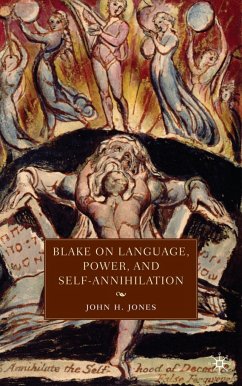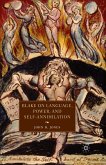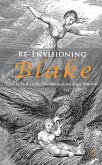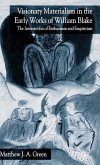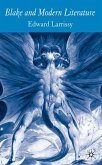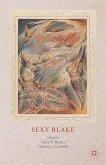Against a historical backdrop that includes eighteenth-century language theory, children's literature and education, debates on the French Revolution, Biblical interpretation, and print culture, Blake on Language, Power, and Self-Annihilation breaks new ground in the study of William Blake. This book analyzes the concept of self-annihilation in Blake s work, using the language theories of Mikhail Bakhtin to elucidate the ways in which his discourse was open to the viewpoints of others, undermines institutional authority, and restores dialogue. This book not only uncovers the importance of self-annihilation to Blake's thinking about language and communication, but it also develops its centrality to Blake's poetic practice.
"This lucidly written book is a welcome contribution to the dialogue about Blake and language. Jones insightful close readings are doubly enriched by eighteenth-century discourses and by a Bakhtinian vision of the effects of language on consciousness and relationships. Blake on Language, Power, and Self-Annihilation moves through Blake s oeuvre to explore the interrelated themes of monologism, dialogism, selfhood, and imposition, and culminates in a particularly fine reading of Jerusalem. Bringing Blake s representations of inspiration, authorship, and the role of the reader into relation with his concept of self-annihilation, this study advances our understanding of the potencies and potentialities of language in Blake s work." - Angela Esterhammer, University of Zurich
"Thiscrucialbook sheds new light on Blake'scomplex conceptsof authorship, inspiration, and what the poet repeatedlyrefers to as Self-Annihilation. It also stands out asone of the fewstudies toapply recenttheoriesconcerning Blake's artistic andproduction methods.The result is a series of superb readings thatilluminate the evolution ofBlake's oeuvre, from the Songs to Jerusalem." - Michael Macovski, Georgetown University
"Thiscrucialbook sheds new light on Blake'scomplex conceptsof authorship, inspiration, and what the poet repeatedlyrefers to as Self-Annihilation. It also stands out asone of the fewstudies toapply recenttheoriesconcerning Blake's artistic andproduction methods.The result is a series of superb readings thatilluminate the evolution ofBlake's oeuvre, from the Songs to Jerusalem." - Michael Macovski, Georgetown University

